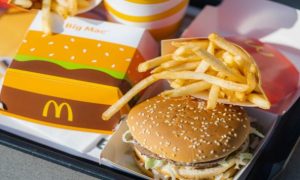- New research shows that flavonoid-rich foods may help to prevent frailty in older adults.
- Researchers found this to be especially true in quercetin-rich foods.
- Here, nutrition experts explain the findings.
As we age, our body naturally loses a degree of bone strength and frailty, or weakness, becomes a more common issue. Now, a new study shows how eating certain foods, including apples, may help keep frailty at bay and keep you feeling stronger as you get older.
Also Read– Top Chinese scientist concedes that coronavirus may have leaked from Wuhan lab
A study published in The American Journal of Clinical Nutrition looked at how certain foods that contain quercetin, a specific subclass of flavonoids (compounds found naturally in many fruits and vegetables that are rich in antioxidant activity), affect frailty in older adults.
The study looked at 1,701 individuals who were not considered frail at the start of the program, and had them fill out a self-questionnaire that assessed flavonoid intake. After 12 years, 13.2% of the participants had developed frailty. Frailty is a common clinical syndrome in older adults that carries an increased risk for poor health outcomes including falls, incident disability, hospitalization, and mortality.
Also Read– US life expectancy problem is ‘bigger than we ever thought,’ report finds

Although total flavonoid intake was not associated with frailty development, each 10 mg/day of higher flavonol intake was linked with 20% lower odds of frailty onset. More specifically, every 10 mg/day of higher quercetin intake was associated with 35% lower odds of frailty onset, while other subclasses of flavonoids showed no association.
Also Read– What is berberine, the supplement dubbed ‘nature’s Ozempic’ on social media?
So, what is quercetin and how does it affect frailty?
Quercetin is a plant compound with antioxidant properties, explains Keri Gans, M.S., R.D., registered dietitian and author of The Small Change Diet. Quercetin is important for our health because they combat inflammation, adds Melissa Prest, D.C.N., R.D.N., national media spokesperson for the Academy of Nutrition and Dietetics and member of the Prevention Medical Review Board.
Also Read- In An Era Of Artificial Intelligence, There’s Always Room For Human Intelligence
Quercetin is found naturally in many foods, including:
- Yellow and green peppers
- Cherries
- Apples
- Red grapes
- Kale
- Berries
- Tea
- Tomatoes
- Broccoli
- Olive oil
- Capers
- Parsley
- Asparagus
- Citrus fruits
- Leafy vegetables
Quercetin has been the topic of scientific research in the past. It has been studied and considered a promising agent in improving bone health and another ongoing clinical trial is specifically studying quercetin’s ability to protect against bone loss and stimulating bone formation. And according to this new study, a higher intake of quercetin was associated with a lower risk of frailty in adults, says Gans.
Also Read– AI in dentistry: Researchers find that artificial intelligence can create better dental crowns
What can older adults do to prevent frailty?
Aside from loading up on quercetin-rich foods, there are other things you can and should do to maintain your strength and lower your risk of frailty later in life. “In order to decrease the risk of frailty in aging adults, one should consume adequate calories daily, especially protein,” says Gans. Protein is very important for older adults and many do not eat enough, adds Prest. “Add some protein-rich foods, low-sugar or plain low-fat yogurt, low-fat milk, beans, eggs, or chicken, to each meal and snack.”
Incorporating a fitness routine that includes walking and resistance exercises is also key, Gans adds. Muscle mass decreases as we age, so engaging in activities like walking and/or strength training can help you stay strong, explains Prest.
People who have strong social connections and continue learning also have a lower risk of frailty, says Prest. So it’s important to keep your mind sharp to keep your body strong.
Also Read– WHO Director Issues Warning For Disease ‘Even Deadlier’ Than COVID
The bottom line
Frailty is not uncommon in older adults, and studies have found that it only becomes more common the older we get. One study found that frailty increased steadily with age, starting with 4% of adults 65-69 years, 7% of adults 70-74 years, 9% of adults 75-79 years, 16% of adults 80-84 years, and 26% of adults aged 85 years and older.
This study is another good reminder that a variety of plant-based foods should be consumed daily for health-promoting benefits, says Gans. So take a good look at what your daily diet looks like, and if you could stand to load up on more quercetin-rich foods, they might just help you maintain your bone strength and keep you from feeling weak in the long run.
While fruits and vegetables are a great way to get quercetin, some people may want to take a quercetin supplement, says Prest. “Make sure to discuss taking a quercetin supplement with your provider since there are some possible interactions between quercetin supplements and antibiotics, anticoagulants, chemotherapy, corticosteroids, cyclosporine, digoxin, fluoroquinolones, and medications changed by the liver,” she notes.
Also Read– Your guide to COVID testing for the unforeseeable future
Dietary supplements are products intended to supplement the diet. They are not medicines and are not intended to treat, diagnose, mitigate, prevent, or cure diseases. Be cautious about taking dietary supplements if you are pregnant or nursing. Also, be careful about giving supplements to a child, unless recommended by their healthcare provider.









































